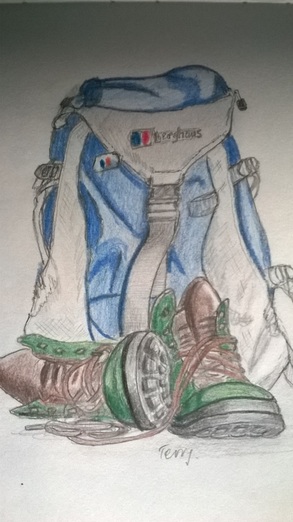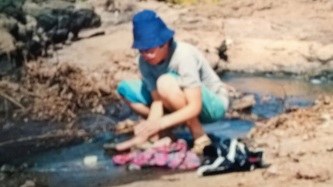| I once had a summer job in a pickle factory in Germany. The work was boring, smelly and noisy but the money, even though being foreign and female entitled the management to pay us at a lower rate, was good. I shared some of the memories for a bite-size memoir challenge on first jobs a couple of years ago, but I didn’t expect I’d turn it into fiction. To be honest, I didn’t find interesting enough. I wrote recently about how fiction can function as a metaphor for the personal stories we struggle to tell. This post is about the reverse side of that, of how, in fiction, we can take a mundane, or shapeless, event from our lives and stretch it into a more intriguing story. The pickle factory was in a village with a couple of pubs, but we had to travel to a larger town in the Netherlands to do our food shopping. If we missed the bus, we’d hitch across the border. Only once did I have any concerns about my safety. |
I don’t know what prompted me to think of this a few months ago, but I got to wondering just what had been in that man’s mind when he turned off the main road. What did he think I would think? Before long, my musings developed into a short story, and I liked it enough to send it off to a competition, something I hadn’t done for a few years.
I was already a writer when I went to work in the pickle factory; I’d even won a student writing prize, but I hadn’t served my time. But I like the idea that winning a competition now with a story based on my late adolescence can be a gift from me to my younger self. There was a bit of Katherine Carlyle’s recklessness in me in those days such that I can’t help breathing a sigh of relief that I came out the other end.
Thanks to The Writer’s Bureau of this vote of confidence in my writing which, even with a novel published, I still need. Do go over to the site to read A Daughter Your Age and tell me what you think.
I planned to pair this post with an apology for dropping out of Irene Waters’ Times Past memoir project at only the second hurdle. After my breathless discovery that I could relate to memoir as social history, I realised that, in contrast to some of the other respondents’ contributions, mine read more like a research report than creative non-fiction. The source of my difficulty became clearer when I analysed my feelings in response to this month’s prompt to write about our first memories of washday.
For me, creative writing is about storytelling, and story derives from character. Even the description of an activity, such as the self-harm scene in the opening chapter of my novel, is revealing of character in the emotions, or lack thereof. So a story about washday is inevitably a story about my mother. Given that part of the reason I make things up is my complicated relationship with my parents, this isn’t something that makes my fingers itch to dance across the keyboard (or, in my case, to dictate to the recalcitrant toddler who lives in my machine).
But one of the great things about being a writer is how the sentences can sometimes flit across our minds uninvited. My subconscious chose to go with the memoir prompt as if it were a flash fiction challenge. The story it’s generated is a little over the usual 99 words, but I think it gives the flavour of washday memories for this kid at the end of the Baby Boomer generation.
| On Mondays, the atmosphere was as steamy as the water in the top-loader, as grey as after the last batch of laundry had been churned through the machine. My stomach was as tight as the clothes squeezed through the ringer, my heart as cold as the wind whipping at my fingers as I pegged the damp sheets on the line. Often, Being Good could take the heat out of my mother, the grey out of a day. Being Good could relax my stomach and take the chill off my hands. But not on Washing Day. I was too young to understand back then but, on Washing Day, my mother felt as trapped by domesticity as a lion in a cage. | This blurry photograph is from a different time and place: me washing clothes in the river in India circa 1985. I was quite proud of my prowess as a dhobi. |























 RSS Feed
RSS Feed





















